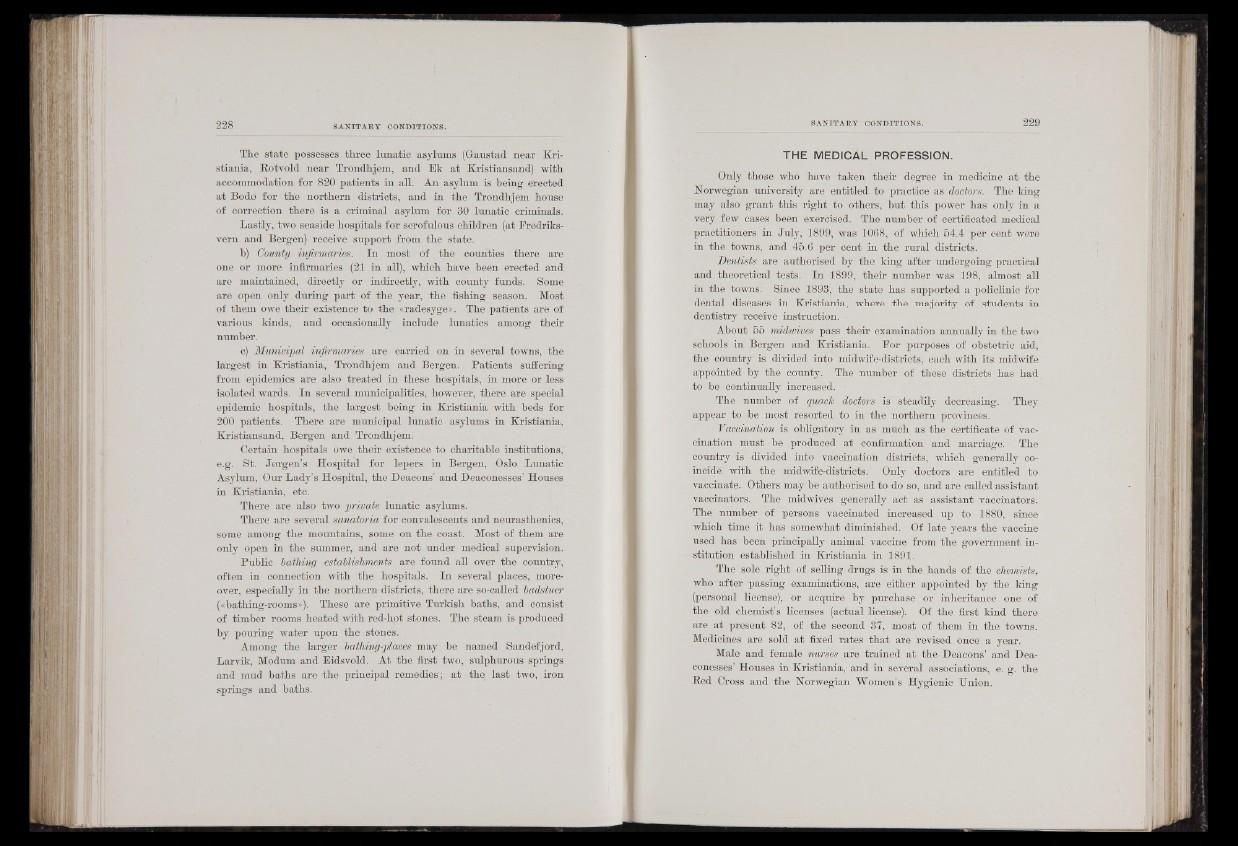
The state possesses three lunatic asylums (Gaustad near Kri-
stiania, Rotvold near Trondhjem, and Ek at Kristiansand) with
accommodation for 820 patients in all. An asylum is being erected
at Bodo for the northern districts, and in the Trondhjem house
of correction there is a criminal asylum for 30 lunatic criminals.
Lastly, two seaside hospitals for scrofulous children (at Fredriks-
vern and Bergen) receive support from the state.
b) County infirmaries. In most of the counties there are
one or more infirmaries (21 in all), which have been erected and
are maintained, directly or indirectly, with county funds. Some
are open only during part of the year, the fishing season. Most
of them owe their existence to the «radesyge». The patients are of
various kinds, and occasionally include lunatics among their
number.
c) Municipal infirmaries are carried on in several towns, the
largest in Kristiania, Trondhjem and Bergen. Patients suffering
from epidemics are also treated in these hospitals, in more or less
isolated wards. In several municipalities, however, there are special
epidemic hospitals, the largest being in Kristiania with beds for
200 patients. There are municipal lunatic asylums in Kristiania,
Kristiansand, Bergen and Trondhjem.
Certain hospitals owe their existence to charitable institutions)'
e.g. St. Jargen’s Hospital for lepers in Bergen, Oslo Lunatic
Asylum, Our Lady’s Hospital, the Deacons’ and Deaconesses’ Houses
in Kristiania, etc.
There are also two private lunatic asylums.
There are several sanatoria for convalescents and neurasthenics,
some among the mountains, some on the coast. Most of them are
only open in the summer, and are not under medical supervision.
Public bathing establishments are found all over the country,
often in connection with the hospitals. In several places, moreover,
especially in the northern districts, there are so-called badstuer
(«bathing-rooms»). These are primitive Turkish baths, and consist
of timber rooms heated with red-hot stones. The steam is produced
by pouring water upon the stones'.
Among the larger bathing-places may be named Sandefjord,
Larvik, Modum and Eidsvold. At the first two, sulphurous springs
and mud baths are the principal remedies^ at the last two, iron
springs and baths.
THE MEDICAL PROFESSION.
Only those who have taken their degree in medicine at the
Norwegian university are entitled to practice as doctors: The king
may also grant this right to others, but this power has only in a
very few cases been exercised. The number of certificated medical
practitioners in July, 1899, was 1068, of which 54.4 pér cent were
in the towns, and 45.6 per cent in the rural districts.
Dentists are authorised by the king after undergoing practical
and theoretical tests. In 1899, their number was 198, almost all
in the townST Since 1893, the state has supported a policlinic for
dental diseases in Kristiania, where the majority of students in
dentistry receive instruction. •
About 55 midwives pass their examination annually in the two
schools in Bergen and Kristiania. Eor purposes of obstetric aid,
the country is divided into midwife-districts, each with its midwife
appointed by the county. The number of these districts has had
to be continually increased.
The number of quack doctors is steadily decreasing. They
appear to be most resorted to in the northern provinces.
Vaccination is obligatory in as much as the certificate of vaccination
must be produced at confirmation and marriage. The
country is divided into vaccination districts, which generally coincide
with the midwife-districts. Only doctors are entitled to
vaccinate. Others may be authorised to do so, and are called assistant
vaccinators. The midwives generally act as assistant vaccinators.
The number of persons vaccinated increased up to 1880, since
which time it has somewhat diminished. Of late years the vaccine
used has been principally animal vaccine from the government institution
established in Kristiania in 1891.
The sole right of selling drugs is in the hands of the chemists,
who after passing examinations, are either appointed by the king
(personal license), or acquire by purchase or inheritance one of
the old chemist’s licenses (actual license). Of the first kind there
are at present 82, of the second 37, most of them in the towns.
Medicines are sold at fixed rates that are revised once a year.
Male and female nurses are trained at the Deacons’ and Deaconesses’
Houses in Kristiania, and in several associations, e. g. the
Red Cross and the Norwegian Women’s Hygienic Union.